Biodiversity & Environment
Review of Maritime Transport 2023: UNCTAD
- 04 Oct 2023
- 6 min read
For Prelims: Review of Maritime Transport 2023, United Nations Conference on Trade and Development (UNCTAD), Covid-19, Greenhouse Gas (GHG) Emissions.
For Mains: Review of Maritime Transport 2023: UNCTAD.
Why in News?
Recently, the United Nations Conference on Trade and Development (UNCTAD) has released the Review of Maritime Transport 2023, highlighting the Issue of Greenhouse Gas (GHG) Emissions from International Shipping and Challenges in Decarbonization.
What are the Key Highlights of the Review?
- Emissions from International Shipping:
- GHG emissions from international shipping were 20% higher in 2023 compared to a decade ago.
- The shipping industry contributes to over 80% of the world’s trade volume and nearly 3% of global GHG emissions.
- Growth in Shipping Volume:
- Global maritime shipping volumes experienced a 0.4% drop in 2022 due to disruptions in global supply chains caused by Covid-19.
- However, it is projected to grow by 2.4% in 2023.
- Containerized trade is expected to grow by 1.2% in 2023 and further by 3% between 2024-2028.
- Oil and gas trade volumes showed robust growth in 2022.
- Non-Availability of Alternative Fuels:
- Early in January 2023, commercial ships were on average 22.2 years old and more than half of the world’s fleet was over 15 years old.
- As the average age of the world fleet is increasing, it raises concern that alternative fuels are not yet available at scale and are more costly, and the ships that can use them are also more costly than traditional ships.
- Transitioninig to Alternative Fuels:
- It is very difficult for ship owners to renew their fleet without clarity on technology and regulatory regimes, and port terminals also face similar challenges, particularly with regard to investment decisions.
- 98.8% of the global fleet uses conventional fuels like heavy fuel oil, light fuel oil, and diesel/gas oil.
- Only 1.2% are using alternative fuels, mainly LNG, LPG, methanol, and to a lesser extent, battery/hybrid.
- However, progress is underway as 21 % of vessels currently on order are designed to run on alternative fuels, notably LNG, LPG, battery/hybrid and methanol.
- Cost Estimates and Transition Challenges:
- Decarbonizing the world's fleet by 2050 could require annual investments ranging from USD 8 billion to USD 90 billion.
- Full decarbonization could double yearly fuel costs, necessitating a just transition for the sector.
- IMO (International Maritime Organization) has set a target to achieve net-zero GHG emissions by around 2050.
- The 2023 IMO GHG Strategy aims for at least 5-10% uptake of zero or near-zero GHG fuels by 2030.
What are the UNCTAD's Recommendations for Economic Incentives?
- Renewable ammonia and methanol fuels are seen as more suitable for newer ships with dual-fuel engines.
- Sustainable marine fuels should achieve zero or near-zero carbon dioxide equivalent emissions on a life-cycle 'well-to-wake' basis.
- UNCTAD advocates for system-wide collaboration, swift regulatory intervention and stronger investments in green technologies and fleets.
- Economic incentives, such as levies or contributions related to shipping emissions, can promote the competitiveness of alternative fuels and support investments in climate-resilient infrastructure.
- There is a need to balance environmental goals with economic needs but underscores that the cost of inaction far outweighs the required investments.
- Beyond cleaner fuels, the Shipping industry needs to move faster towards digital solutions like AI and blockchain to improve efficiency as well as sustainability.
What are the Initiative of International bodies to Decarbonize International Shipping?
- Energy Efficiency Existing Ship Index (EEXI):
- IMO is revising its existing carbon intensity regulations for ships with EEXI, which limits the technical carbon intensity of the ship by limiting how much carbon dioxide the ship is designed to emit based on its size and ship type, and the Carbon Intensity Indicator (CII), which grades ships from A-E based on their operational carbon intensity, based on how much fuel the ships use each year.
- IMO’s Mid-Term Measures:
- Additionally, IMO is developing new regulations called Mid-Term Measures, which will include a technical element, most likely a Greenhouse Gas Fuel Standard (GFS), as well as an economic element, such as a carbon levy, a feebate system, or cap-and-trade.
- The IMO aims to agree on these measures by 2025 and have them enter into force in 2027.
- The Green Voyage 2050 Project:
- It is a partnership project between the Government of Norway and IMO launched in May 2019 aiming to transform the shipping industry towards a lower carbon future.
- International Convention for the Prevention of Pollution from Ships (MARPOL Convention):
- MARPOL convention is the main international convention covering prevention of pollution of the marine environment by ships from operational or accidental causes.
- The MARPOL Convention was adopted on 2nd November 1973 at IMO.







